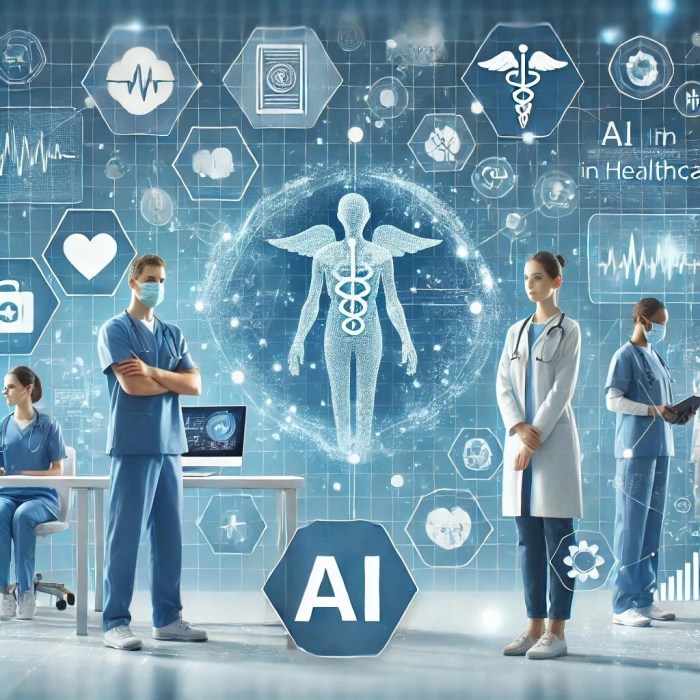Starting with AI in healthcare: What it means for patients, the discussion unfolds in a captivating and informative manner, drawing readers in with a promise of engaging insights into this revolutionary topic.
The following paragraph will delve into the details and specifics of the subject matter, providing a comprehensive overview of the impact of AI on patient care.
Introduction to AI in Healthcare
Artificial Intelligence (AI) in healthcare refers to the use of advanced technology and algorithms to mimic human cognitive functions in order to analyze complex medical data. This innovative approach has shown great potential in transforming patient care by improving diagnostics, treatment plans, and overall healthcare delivery.AI plays a significant role in healthcare by enhancing the accuracy and efficiency of medical processes, ultimately leading to better patient outcomes.
With the ability to process vast amounts of data quickly and accurately, AI can assist healthcare professionals in making more informed decisions and providing personalized care to patients.
Examples of AI Applications in Healthcare for Patient Benefits
- Medical Imaging Analysis: AI algorithms can analyze medical images such as X-rays, MRIs, and CT scans to detect abnormalities and assist radiologists in making accurate diagnoses.
- Predictive Analytics: AI can be used to predict patient outcomes and identify individuals at risk of developing certain conditions, allowing for early intervention and preventive measures.
- Virtual Health Assistants: AI-powered chatbots and virtual assistants can provide patients with medical information, schedule appointments, and offer personalized health recommendations.
- Precision Medicine: AI algorithms can analyze genetic and clinical data to tailor treatment plans to individual patients, ensuring more effective and personalized care.
AI for Personalized Treatment
AI plays a crucial role in tailoring treatment plans to individual patients, revolutionizing the healthcare industry by providing personalized medicine based on specific patient needs and characteristics.
Predicting Patient Outcomes
AI in healthcare utilizes advanced algorithms and machine learning to predict patient outcomes with a high degree of accuracy, helping healthcare providers make informed decisions regarding patient care and treatment.
Examples of AI-Driven Personalized Medicine
- One example of AI-driven personalized medicine is the use of genetic data to identify the most effective treatment for cancer patients based on their genetic makeup, ensuring targeted therapies and minimizing side effects.
- Another example is the application of AI in analyzing patient data to predict the likelihood of developing certain diseases, allowing for early interventions and preventive measures to improve patient outcomes.
- AI-powered wearable devices can monitor vital signs and health metrics in real-time, providing personalized health insights and recommendations to individuals for better management of their health.
Enhancing Diagnostics with AI

AI technology has revolutionized the field of healthcare by significantly enhancing diagnostic processes for patients. By leveraging machine learning algorithms and data analysis, AI can improve diagnostic accuracy, leading to better treatment outcomes and patient care.
Impact of AI on Early Disease Detection
AI plays a crucial role in early disease detection by analyzing vast amounts of patient data to identify subtle patterns and indicators that may go unnoticed by human healthcare providers
- One example of AI tools used in medical imaging for patient diagnosis is Computer-Aided Detection (CAD) systems. These systems can assist radiologists in interpreting medical images, such as X-rays, MRIs, or CT scans, by highlighting areas of interest or abnormalities that may require further attention.
- Another example is AI-powered pathology tools that can analyze tissue samples to detect cancerous cells with high accuracy. These tools can help pathologists make more precise diagnoses and develop personalized treatment plans for patients.
AI and Patient Engagement
AI technologies play a crucial role in enhancing patient engagement in healthcare by providing personalized interactions and empowering patients to take control of their health.
Benefits of AI-powered Virtual Assistants
- Virtual assistants powered by AI offer 24/7 support to patients, providing instant responses to queries and concerns.
- These assistants can schedule appointments, send medication reminders, and offer valuable health tips, improving patient adherence to treatment plans.
- AI-powered virtual assistants can also collect and analyze patient data to provide personalized recommendations, enhancing the overall patient experience.
Examples of AI Applications Empowering Patients
- Health monitoring apps equipped with AI algorithms allow patients to track their vitals, receive real-time feedback, and make informed decisions about their health.
- AI-driven chatbots enable patients to ask medical questions, assess symptoms, and receive guidance on when to seek professional help, promoting proactive healthcare management.
- Personalized treatment plans generated by AI algorithms based on individual patient data empower patients to actively participate in their care and make informed decisions about their well-being.
Conclusion
Concluding the dialogue on AI in healthcare: What it means for patients, a brief and compelling summary encapsulates the key takeaways, leaving readers with a lasting impression of the transformative power of AI in the healthcare industry.
Questions and Answers
How does AI personalize treatment for patients?
AI tailors treatment plans by analyzing individual patient data and medical history to create customized care strategies.
What role does AI play in enhancing diagnostics for patients?
AI improves diagnostic accuracy by rapidly analyzing vast amounts of data to assist healthcare providers in making more precise and timely diagnoses.
How can AI technologies improve patient engagement in healthcare?
AI technologies enhance patient engagement by providing personalized interactions, reminders, and support, ultimately empowering patients to actively participate in their healthcare journey.



